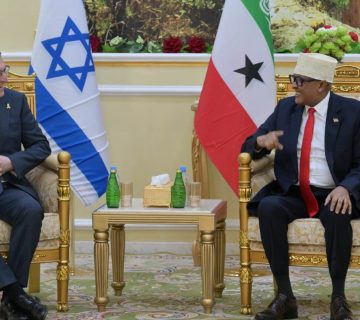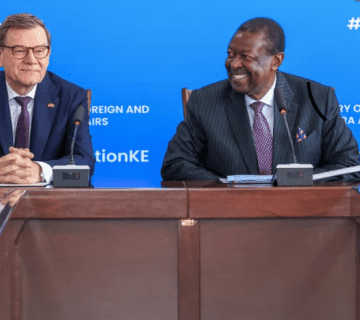On June 22, 2019, an attempted coup in Bahir Dar, the capital of Ethiopia’s largest regional state, Amhara, and a related attack in the country’s capital, Addis Ababa, left five senior political and military officials dead. State President Ambachew Mekonnen, Ezez Wassie (Ambachew’s senior adviser), Attorney General Migbaru Kebede, Army Chief of Staff General Seare Mekonnen, and retired Major General Gezai Abera died in the aborted insurrection, according to a statement by the Prime Minister’s office. Both Seare and Gazai were killed by Seare’s bodyguard in his Addis Ababa residence. The statement also confirmed that Amhara State Security Head, General Asamnew Tsige, is responsible for the attack, but gave no details of his whereabouts. Media reports indicate that the attack took place during an executive meeting of top officials led by President Ambachew Mekonnen, a close ally of Prime Minister Abiy Ahmed, regarding how to stop the open recruitment of ethnic Amhara militias by Asamnew. Donning military fatigues, Prime Minister Abiy Ahmed gave a televised press conference in the late hours of Saturday, calling upon Ethiopians to stand and cooperate with the government in defending the unity of Ethiopia, making it clear that the failed coup was not committed by any specific ethnic group but by ill-motivated individuals.
In the week preceding the attack, Asamnew, in a Facebook video, had advised the Amhara people, one of the largest Ethiopian ethnic groups and whose language is one of the official languages of the country, to arm themselves in preparation for fighting against other groups. Asamnew, who was released from prison last year after having spent a decade in prison for an attempted coup against the previous regime in 2009, was appointed as head of security for the Amhara Regional State as part of the larger reconciliation process initiated by Prime Minister Abiy.
The link between the two attacks was not immediately clear. In an attempt to regulate increased speculation and rumors, the government shut down the internet. It also installed army and police checkpoints around Addis Ababa to tighten security. The US Embassy in Addis, along with other embassies, issued security alerts to their nationals and acknowledged the firing of gunshots both in Addis Ababa, and in and around Bahir Dar.
Unease over Radical Reforms
Considered a breath of fresh air after assuming power in April 2018, Prime Minister Ahmed Abiy has had a fast-paced first year in office, sweeping the country with an aggressive radical reform agenda. These include shuffling of cabinet positions; installing regional presidents loyal to Abiy in various regions; freeing of thousands of political prisoners; enabling more freedom of press through the lifting of bans on websites and other media platforms; firing and arresting controversial civil servants and high ranking officials; and ending the prolonged state of emergency. In the immediate aftermath of these reforms, some have argued that the changes were implemented hurriedly, and had the potential to destabilize Ethiopia.
There are two interconnected aspects underlying the recent coup attempt in Amhara. First, transitioning from a one-party repressive state to a more open (liberal) democracy is a complex challenge. Ethnic tensions were repressed by the strong Ethiopian People’ Revolutionary Democratic Front (EPRDF) and regional hopes of secession or more autonomy were crushed. Abiy’s more liberal stance might have opened up possibilities for regional organizations and strongmen to gain more power. The release of thousands of political prisoners, such as General Asamnew Tsige, which allowed exiled fighters and politicians to come back to Ethiopia without any form of control or regulation can destabilize any country, let alone one in the midst of a democratic transition.
Second, Abiy’s hopes of redistributing power across the country has reignited simmering ethnic tensions and enabled the rise of nationalist ethnic groups pushing for greater regional autonomy from the central government. Historic and personal grievances to land and resources and the aspiration for self-determination and greater autonomy are also fueling the growing proto- nationalist sentiment. The Amhara region was once the most influential in Ethiopia, establishing Amharic as a national language, and dominating powerful positions during imperial times. However, after the EPRDF took over through a coup, the Amhara were treated as any other ethnic group. Prolonged repression by the EPRDF, increasing marginalization from the political center, alleged ‘land grabbing’ by Tigrayans, and a growing perception of ethnic discrimination have contributed to an increase in Amhara nationalism.
Implications for Ethiopia’s Future
The stability of Ethiopia, Africa’s second most populous nation, is of vital importance to the stability of the Horn region and the continent at large considering its status as an anchor state. The attempted coup, which undermined the central government by displaying its weaknesses in protecting its people and succeeding in taking out Abiy’s close allies, was undoubtedly the biggest setback for the Prime Minister and Ethiopia’s transition to democracy as a whole. Additionally, the coup also highlights the deep and persistent ethnic cleavages in the country and thus calls for specific attention to the issue in the coming months, in addition to comprehensively reconsidering Ethiopia’s reform agenda.
The implications for the 2020 elections cannot be overlooked. It is imperative that the dynamics of that election, including regional ethnic rivalries and whether there will be delay, are adequately addressed. Media reports indicated that postponing the 2020 election can cause an adverse social reaction, further fuelling regional tensions, and damaging Abiy’s democratic credentials. Additionally, the coup could force Prime Minister Abiy Ahmed to show his hand with regards to several key issues, such as his reform agenda, the future of Ethiopian federalism, and the future of the EPRDF as a single coalition (party).
Jules Swinkels is a Research Fellow at the HORN Institute, while Jihan Korane is IGAD Liaison Officer.
Photo Credit: VOA



